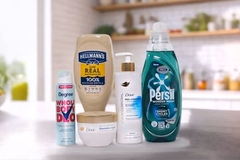Meta-beauty revolution: L’Oréal investment signals new era of transporting cosmetic brands into virtual worlds

13 Jan 2023 --- L’Oréal has issued its first venture capital investment in the metaverse and Web3 space, signaling industry’s readiness to adapt to an evolving digital landscape. L’Oréal’s corporate venture capital fund BOLD (Business Opportunities for L’Oréal Development) has made a minority investment in US-based startup, Digital Village, a metaverse-as-a-service platform and NFT marketplace for brands, creators and communities.
“As L’Oréal continues to explore and define what beauty means in Web3, we seek to work with the most promising startups who adhere to the highest possible visual and technical standards,” remarks Camille Kroely, chief metaverse and Web3 officer at L’Oréal.
“We are excited to be partnering with Digital Village, whose solutions will be powerful enablers for our brands and whose ideals of sustainability, accessibility and interoperability in the metaverse or Web3 are ones we share.”

Studies have projected the size of the metaverse market to be anywhere between US$500 million and US$1 trillion by 2030, highlights researchers at the Capgemini Research Institute.
“Consumers believe immersive technologies will be valuable to them during their buying cycle,” they share. “Our research indicates that consumers are interested in immersive experiences, made available through mobiles, web browsers, voice assistants, sensors and extended reality (ER) headsets.”
“Half of the consumers we surveyed felt that immersive experiences could be both impactful and valuable in their buying journeys.”
 Digital Village offers new, scalable technologies for the creation and interaction of digital identities and assets in virtual worlds.Finding a brand’s digital identity
Digital Village offers new, scalable technologies for the creation and interaction of digital identities and assets in virtual worlds.Finding a brand’s digital identity
Using an open network of decentralized 3D virtual and hybrid spaces, the metaverse exists in parallel to the physical world and is designed to combine online digital and real-life experiences, independent of place, time or device.
The metaverse can be experienced right now via Web 2.0 (the current internet) through games such as Roblox or Fortnite, and platforms such as Meta’s Horizon Worlds, Spatial, Decentraland, The Sandbox and other real-time 3D-featured environments.
Web3 will transition this experience layer to the mainstream, with improvements that mimic real-life sensations and co-presence. The virtual worlds will be interoperable, while its infrastructure and governance models become decentralized.
Led by an international team spanning the US, Europe and Asia, Digital Village offers new, scalable technologies for the creation and interaction of digital identities and assets in virtual worlds – which could be integrated into engagement platforms for beauty brands.
“Together, we are setting the bar for beauty in the metaverse and Web 3.0, pushing the boundaries of what is possible and setting a new standard for the industry to follow,” says Evelyn Mora, founder and CEO of Digital Village.
The Venture Reality Fund (VR Fund), a Silicon Valley-based tech VC firm specialized in virtual reality (VR) and augmented reality (AR), is co-leading this Seed financing round in Digital Village alongside BOLD.
Dawn of a new metaworld
Mixed reality, including AR and VR, has allowed companies to provide a differentiated customer experience. A latest Capgemini Research Institute report, Total immersion: How immersive experiences and the metaverse benefit customer experience and operations, has examined the potential and impact of these technologies.
Surveying 8,000 consumers and 1,000 organizations across various sectors and geographies, the institute found that there is high customer interest in immersive technologies and organizations are able to benefit from these in their internal operations as well.
L’Oréal – which previously explored the metaverse’s applications in services like skin diagnosis and teleconsultation – joined a host of other large scale cosmetics players including MAC Cosmetics and Chanel in rolling out technologies that allow users to try on their lipstick or eyeshadow virtually.
MAC Cosmetics, in particular, uses AR to enable the consumer to select cosmetics based on their skin tone, then to try out products virtually, getting a comprehensive understanding of the product in relation to their own preferences. Last month, Laura Mercier launched a virtual store called “The World of Laura Mercier” displaying three interactive Parisian-styled virtual rooms in an HD, 3D and 360-degree experience (Image credit: Laura Mercier).
Last month, Laura Mercier launched a virtual store called “The World of Laura Mercier” displaying three interactive Parisian-styled virtual rooms in an HD, 3D and 360-degree experience (Image credit: Laura Mercier).
“Our founding mantra at MAC is: All Ages, All Races, All Genders,” says Sonia Anand, executive director, Global Digital Retail Innovation. “We needed AI and AR that could seamlessly adapt to different skin tones and face shapes. We require the same sense of inclusivity with our technology that we embrace in our products.”
This has enabled MAC cosmetics to gain 200% more engagement and a strong conversion pipeline, the company reports.
In other recent developments, cosmetics brands Laura Mercier and Orveon partnered with experiential e-commerce platform Obsess to create a virtual store called “The World of Laura Mercier” displaying three interactive Parisian-styled virtual rooms enabling an HD, 3D and 360-degree experience.
Streamlining purchases
Brands can also choose to partner with retailers to create engaging experiences for the audience. Hélène Labaume from Carrefour shares one example in the home care sector: “We co-created with Procter & Gamble (P&G) a metaverse experience with their product, Mr. Clean. The goal was to create a bridge between metaverse and e-commerce.”
“P&G had a metaverse house dedicated to this product, that people can enter [into] as an avatar and see how the product works,” she highlights. “Next to the product, visitors could click on a Carrefour bubble in order to purchase the product on Carrefour e-commerce.
“We also had a solo gaming experience where people had to clean as fast as they could in order to win points and vouchers from Carrefour to spend on our e-commerce.”
Several factors, however, are holding back the widespread adoption of immersive experiences and the metaverse, concede the researchers at Capgemini Research Institute. “Significant concerns remain on the consumer side surrounding issues like privacy and safety, while organizations are faced with scaling challenges,” they note.
While the novelty of the immersive experience will attract consumers, the greater challenge is retention, underscore the researchers at Capgemini Research Institute. The answer, partly, lies in building a strong community aspect to your experiences and content.
Last September, personalized brand experience designer Revieve released a complete metaverse playbook for beauty brands to take full advantage of virtual spaces, outlining the future of the metaverse and giving advice on how personal care companies might better navigate it.
By Benjamin Ferrer













